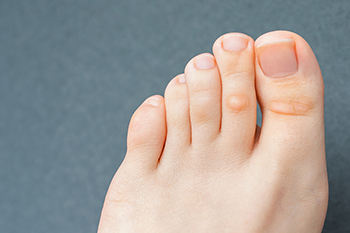
Corns on the feet are a prevalent and often painful foot condition that can affect anyone. These small, thickened areas of skin typically develop in response to excessive pressure or friction, often found on the toes or the soles of the feet. Corns are the body's defense mechanism, building up layers of skin to protect against irritation. They can be hard or soft, depending on their location and the amount of pressure they endure. One of the primary causes of corns is wearing ill-fitting footwear, especially shoes that are too tight or have high heels, as they squeeze and rub against the feet. Abnormalities in foot structure, such as bunions or hammertoes, can also lead to increased pressure and corn formation. Additionally, activities that involve repetitive friction, like jogging or walking long distances, can contribute to corn development. Understanding the definition and causes of corns on the feet is the first step in preventing and managing this uncomfortable condition. Wearing proper footwear, regular foot care, and seeking professional guidance from a podiatrist can help to alleviate the discomfort and ensure your feet remain healthy and pain-free. If you have developed corns on any part of your foot, it is suggested that you confer with a podiatrist who can offer you effective prevention and relief tips.
Corns can make walking very painful and should be treated immediately. If you have questions regarding your feet and ankles, contact Philip K. Schrumpf, DPM of Active Feet Clinic. Our doctor will treat your foot and ankle needs.
Corns: What Are They? And How Do You Get Rid of Them?
Corns are thickened areas on the skin that can become painful. They are caused by excessive pressure and friction on the skin. Corns press into the deeper layers of the skin and are usually round in shape.
Ways to Prevent Corns
There are many ways to get rid of painful corns such as:
- Wearing properly fitting shoes that have been measured by a professional
- Wearing shoes that are not sharply pointed or have high heels
- Wearing only shoes that offer support
Treating Corns
Although most corns slowly disappear when the friction or pressure stops, this isn’t always the case. Consult with your podiatrist to determine the best treatment option for your case of corns.
If you have any questions please feel free to contact our office located in Missoula, MT . We offer the newest diagnostic and treatment technologies for all your foot and ankle needs.
